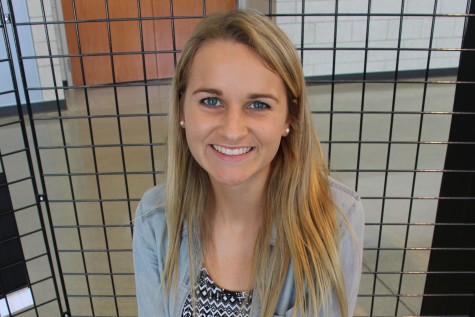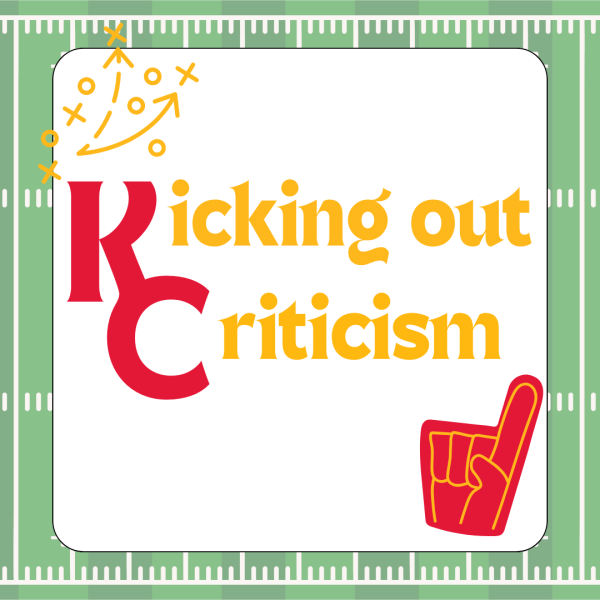School Pressures Cause Students to Struggle with Caring for their Health
Junior Cooper Courtney could barely lift her head off of her pillow or get out of bed. With the strike of mononucleosis(mono), she suffered a fever for nine days, pounding headaches and stomach and liver issues. After seven different blood tests, she was able to somewhat return to her routine, but in the meantime, a month of missing school work and basketball had piled, with finals quickly approaching.
“My symptoms had died down, but when I came back, getting up was definitely a struggle,” Courtney said. “I started with half days at school, and it was hard because it was right when basketball was starting, so I was trying to go to practice and get in shape for that. Then I fell asleep during almost every class, and, yeah, it was hard.”
With the migration of the arctic winds of winter, it is almost certain that the flu bug will find its way to Kansas as well. According to the Centers for Disease Control and Prevention (CDC), 78 percent of flu activity reached its highest in Dec through Feb from 1983 to 2014. Young adults, on average, have two to three colds a year, which brings almost every student to at some point be laying in bed with a Kleenex pile next to him or her, trying to determine whether coming to school is really worth it.
With constant tests, homework assignments and projects, missing one day of school is not always the simplest decision. It can just as well be easier to come to school with a bag of cough drops and suck up the symptoms for a couple of days.
“Usually I’ll have a lab or tests or something, and it’s kind of hard to make them up,” Junior Rathi Narayan said, “I’d rather not come in later and do them because all of the teachers will usually tell you in advance that we’re having this test or this lab. So, I usually just come in even if I’m sick so I don’t have to make up the work later.”
Menacing make up work causes students to question the importance of their health, but students need to take a step back from all the stress and realize that one or two days will not be the end of the world. School policy does not limit how many excused absences a student can take; it is possible and necessary for students to allow time off for their body and mind to restore itself.
“For one, your body doesn’t have a chance to rest and heal if you’re at school, and that’s really what your immune system needs is time to lay down, to sleep, to push fluids and to allow your immune system to fight off whatever infection is invading your body,” School nurse Mitzi Edwards said. “When you’re up and around at school, it puts that whole healing process on hold.”
However, not all symptoms are worthy to phone in sick and watch Netflix all day. A mild sore throat, cough, runny nose or congestion are unrestricting symptoms that allow students to continue with their daily routine. When figuring if symptoms are harsh enough to stay home, Edward recommends looking for a fever as a sure sign of sickness. Edwards says that a fever is a recognizable symptom that states that the immune system is fighting something, in which she advises the student to stay home and rest.
“If you have to go to the doctor for what you’re sick for, and they tell you that you have to rest then I think you should stay home for sure,” Narayan said. “When you have a fever you shouldn’t come to school. I usually don’t come to school when I have a fever or am taking antibiotics, but I come to school when I have a cold or something simple.”
Sleep contributes enormously to the general well-being of a person — it is essentially the food for the brain. The amount of sleep a person gets affects his or her growth, mood and ability to think. Teenagers should average eight to nine hours of sleep a night, but over 50 percent of high school students sleep seven hours or less, according to Student Pulse.
As workload increases, so does the preciousness of sleep. According to the Center for Advancing Health, nearly 20 percent more seniors have sleep deficits than freshmen. Senior Jacob Hegna considers himself to fit into that category, averaging five to six hours of sleep a night.
“My activities definitely attribute to my being tired because I usually don’t stop thinking about things and relaxing until a lot later in the night because of things I’m working on,” Hegna said. “So I don’t feel like it’s time to go to bed until much later. I’m pretty used to not getting enough sleep, but during my first hour I usually don’t learn as much as compared to my fourth hour because I’m still tired and waking up.”
Lack of sleep in teenagers cannot solely be blamed on workload, unfortunately. Students tend to not want to do their work and procrastinate, which leads to harm their health and wellness from sleep deficiency. Although it’s necessary to relax after a day of work, planning out the day could allow for more time to do responsibilities while maintaining healthy habits.
“After you have a bunch of hard classes and work you need time to unwind because it’s not good for you if you have work all day and then come home and just do the same thing,” Narayan said. “It’s important to have time to yourself.”
Every person needs to recognize the importance of health and balance it with school and other activities. High schoolers are too caught up in everything that they’re involved with that they fail to give their bodies the time that it needs. Something as simple as keeping a planner to manage time can allow students more sleep and benefit their health. Every habit that a person establishes now continues with him or her in the future, so it is vital to take care of the body and limit stress.
“Just realizing that taking care of your body is very important and getting over your illness and in the long run,” Edwards said. “Young people, and I was like this too, tend to feel invincible, like ‘oh we can just pop a pill and go back to school and do okay,’ but really, your body says otherwise. You do need to take the time to rest and give your body a chance to heal because the teachers here are awesome, the administrators are great, [and] we all are going to get sick as well and work with students to help them get caught up.”









